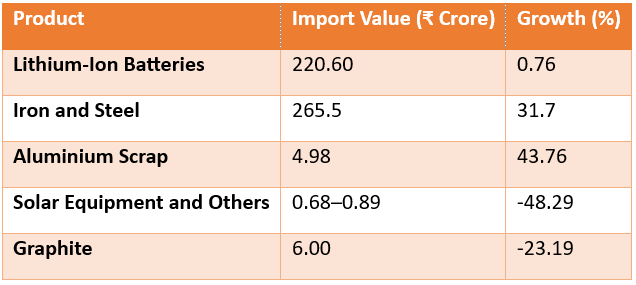India is facing a potential surge in imports from China as a result of increased tariffs on Chinese products imposed by the United States. This could lead to a significant threat of dumping—where Chinese goods are sold in India at much lower prices, undermining domestic industries. According to experts, Indian imports of Chinese goods such as solar panels, steel, lithium-ion batteries, and toys are expected to rise as a consequence of the current trade dynamics.
The article highlights that the ongoing US-China trade conflict, particularly the additional tariffs on Chinese products by the US, could drive China to find alternative markets for its surplus goods, with India being a prime destination. The Indian government and local industries are increasingly worried about the possibility of Chinese manufacturers selling goods below the fair market price, which could have adverse effects on Indian manufacturers, especially in the steel and solar sectors.
Import Projections from China for 2024
The following table represents the projected imports from China to India in 2024 for various key sectors:

Impact on Indian Industries
The biggest concern revolves around industries such as solar panels and iron and steel, where dumping from China could disrupt pricing, making it difficult for Indian manufacturers to compete. The expected 31.7% rise in iron and steel imports and a 43.76% rise in aluminium scrap imports suggest that Chinese manufacturers might soon start flooding the Indian market with low-cost alternatives.
The lithium-ion battery market, a crucial component of electric vehicle production, is also vulnerable to an influx of cheap Chinese imports. Though the growth in imports of lithium-ion batteries is currently projected at a modest 0.76%, any sudden shift in trade policies could easily change this trajectory, further exacerbating the threat.
Measures to Counter the Threat
To counter these challenges, the Indian government must strengthen its anti-dumping measures and ensure strict monitoring of trade practices. The Directorate General of Trade Remedies (DGTR) plays a key role in evaluating cases of dumping and implementing corrective duties to protect Indian industries from unfair competition.
India’s domestic manufacturing sector, especially in critical areas like steel and solar power, needs robust government support through subsidies and protective tariffs. Failure to do so could lead to a situation where domestic companies are priced out of the market, leading to job losses and negative impacts on India’s self-reliance goals.
The dumping threat from China poses a significant risk to India’s economy, especially in sectors that are vital for the country’s growth and energy security. By enforcing stricter anti-dumping regulations and bolstering domestic industries, India can mitigate these risks and protect its industries from unfair trade practices.
The projected increase in imports of Chinese goods, as illustrated in the table above, serves as a wake-up call for policymakers to take swift action to secure India’s economic future.






